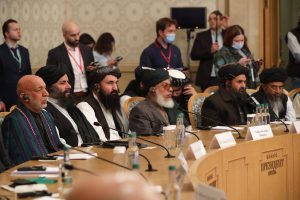“They should go,” Suhail Shaheen, a member of the Taliban negotiation team, told reporters in Moscow. He was talking about the United States, which in a February 2020 agreement charted an exit plan that would see a full withdrawal by May 1, 2021.
“After that, it will be a kind of violation of the agreement. That violation would not be from our side… Their violation will have a reaction,” he said.
Shaheen did not elaborate on what form the “reaction” would take, but in keeping with the agreement they signed in February 2020, the Taliban have not attacked U.S. or NATO forces. While the Taliban have stuck to that aspect of the agreement, the United States has consistently indicated that it does not believe the Taliban are fulfilling all of their obligations under the agreement — for example the stipulation that the Taliban not allow groups like al-Qaida space to operate. Moreover, while attacks on U.S. and NATO forces have abated, attacks on Afghan government forces have continued apace, and there has been a concerning rise of targeted attacks on Afghan journalists, politicians, and activists, which the Afghan government pegs on the Taliban (although some have been claimed by the Islamic State).
Shaheen’s comments came a day after the Taliban gathered with representatives from the Afghan government and from Russia, the United States, China, and Pakistan to move the stalled peace process forward. The four international observers issued a joint statement outlining 10 points of agreement that included a call for a reduction in violence and a plea for the Taliban not to begin a spring offensive, as well as a firm statement that the four did not support the restoration of an Islamic Emirate in Afghanistan. The statement encouraged the parties to pursue a peaceful, negotiated settlement to the conflict and advocated for a “durable and just political resolution.”
The statement was welcomed in Kabul. Shaheen, however, reaffirmed the Taliban’s demand for an Islamic government in Afghanistan, one of many points of contention between the two parties. Intra-Afghan talks began in September 2020, but have stagnated. To date the two sides have agreed on rules and procedures for the talks, but have yet to settle on an agenda. Kabul, backed by the United States, prioritizes a ceasefire and then in-depth talks on the country’s future political arrangement. The Taliban envision hacking out a political arrangement first, and a ceasefire later.
All the while, the Biden administration’s ongoing review of its Afghan strategy and the February 2020 deal perpetuates the overall uncertainty. In a recent, though undated, letter, U.S. Secretary of State Antony Blinken outlined U.S. plans and suggestions, in an attempt to get the talks rolling again. He mentioned:
… a “high-level diplomatic effort” to “move matters more fundamentally and quickly toward a settlement and a permanent and comprehensive cease-fire” to include ministerial-level talks between Russia, China, Pakistan, Iran, India, and the United States; dispatching Ambassador Zalmay Khalilzad to share proposals with both the Afghan government and the Taliban aimed at charting a route to a negotiated settlement and a ceasefire; asking Turkey to host a senior-level meeting to finalize a peace agreement; and redoubling efforts to bring down levels of violence in Afghanistan, with Blinken mentioning a proposal for a 90-day reduction-in-violence that Khalilzad will bring to the two sides for consideration.
The peace proposal being shopped around by Khalilzad raised a stink in Kabul, which took the suggestion of a transitional “peace” government as closer to a demand. But the U.S. insistence on lowering levels of violence — in Blinken’s letter, in the proposed peace solution, in the joint statement — aligns with Kabul’s desires.
U.S. President Joe Biden has long advocated for an exit from Afghanistan, but like his predecessors is finding himself in the quicksands of legacy, obligation, and worry about the future. NBC reported a source commenting yesterday that “Biden wants out” of Afghanistan, but that leaders in the Pentagon are making the pitch to stay at least a little longer. The range of proposals being considered reportedly includes pulling out on or near May 1, remaining indefinitely, or aiming for a six-month extension, which would kick the withdrawal back to November.
In an interview with ABC on Wednesday, Biden characterized the May 1 deadline as “tough.”
With reporting from the Associated Press’ Vladimir Isachenkov, Kathy Gannon, and Rahim Faiez.

































